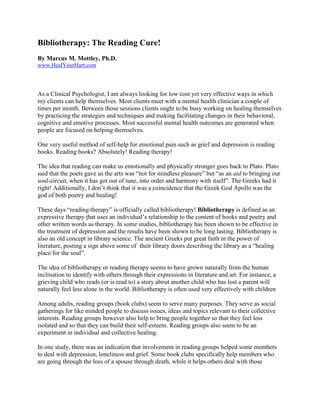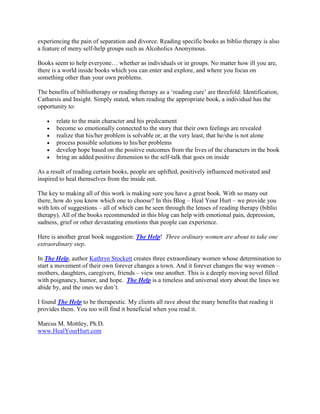Bibliotherapy: The Reading Cure
- 1. Bibliotherapy: The Reading Cure! By Marcus M. Mottley, Ph.D. www.HealYourHurt.com As a Clinical Psychologist, I am always looking for low cost yet very effective ways in which my clients can help themselves. Most clients meet with a mental health clinician a couple of times per month. Between those sessions clients ought to be busy working on healing themselves by practicing the strategies and techniques and making facilitating changes in their behavioral, cognitive and emotive processes. Most successful mental health outcomes are generated when people are focused on helping themselves. One very useful method of self-help for emotional pain such as grief and depression is reading books. Reading books? Absolutely! Reading therapy! The idea that reading can make us emotionally and physically stronger goes back to Plato. Plato said that the poets gave us the arts was ŌĆ£not for mindless pleasureŌĆØ but ŌĆ£as an aid to bringing our soul-circuit, when it has got out of tune, into order and harmony with itselfŌĆØ. The Greeks had it right! Additionally, I donŌĆÖt think that it was a coincidence that the Greek God Apollo was the god of both poetry and healing! These days ŌĆ£reading therapyŌĆØ is officially called bibliotherapy! Bibliotherapy is defined as an expressive therapy that uses an individualŌĆÖs relationship to the content of books and poetry and other written words as therapy. In some studies, bibliotherapy has been shown to be effective in the treatment of depression and the results have been shown to be long lasting. Bibliotherapy is also an old concept in library science. The ancient Greeks put great faith in the power of literature, posting a sign above some of their library doors describing the library as a ŌĆ£healing place for the soulŌĆØ. The idea of bibliotherapy or reading therapy seems to have grown naturally from the human inclination to identify with others through their expressions in literature and art. For instance, a grieving child who reads (or is read to) a story about another child who has lost a parent will naturally feel less alone in the world. Bibliotherapy is often used very effectively with children Among adults, reading groups (book clubs) seem to serve many purposes. They serve as social gatherings for like minded people to discuss issues, ideas and topics relevant to their collective interests. Reading groups however also help to bring people together so that they feel less isolated and so that they can build their self-esteem. Reading groups also seem to be an experiment in individual and collective healing. In one study, there was an indication that involvement in reading groups helped some members to deal with depression, loneliness and grief. Some book clubs specifically help members who are going through the loss of a spouse through death, while it helps others deal with those
- 2. experiencing the pain of separation and divorce. Reading specific books as biblio therapy is also a feature of meny self-help groups such as Alcoholics Anonymous. Books seem to help everyoneŌĆ” whether as individuals or in groups. No matter how ill you are, there is a world inside books which you can enter and explore, and where you focus on something other than your own problems. The benefits of bibliotherapy or reading therapy as a ŌĆśreading cureŌĆÖ are threefold: Identification, Catharsis and Insight. Simply stated, when reading the appropriate book, a individual has the opportunity to: ŌĆó relate to the main character and his predicament ŌĆó become so emotionally connected to the story that their own feelings are revealed ŌĆó realize that his/her problem is solvable or, at the very least, that he/she is not alone ŌĆó process possible solutions to his/her problems ŌĆó develop hope based on the positive outcomes from the lives of the characters in the book ŌĆó bring an added positive dimension to the self-talk that goes on inside As a result of reading certain books, people are uplifted, positively influenced motivated and inspired to heal themselves from the inside out. The key to making all of this work is making sure you have a great book. With so many out there, how do you know which one to choose? In this Blog ŌĆō Heal Your Hurt ŌĆō we provide you with lots of suggestions ŌĆō all of which can be seen through the lenses of reading therapy (biblio therapy). All of the books recommended in this blog can help with emotional pain, depression, sadness, grief or other devastating emotions that people can experience. Here is another great book suggestion: The Help! Three ordinary women are about to take one extraordinary step. In The Help, author Kathryn Stockett creates three extraordinary women whose determination to start a movement of their own forever changes a town. And it forever changes the way women ŌĆō mothers, daughters, caregivers, friends ŌĆō view one another. This is a deeply moving novel filled with poignancy, humor, and hope. The Help is a timeless and universal story about the lines we abide by, and the ones we donŌĆÖt. I found The Help to be therapeutic. My clients all rave about the many benefits that reading it provides them. You too will find it beneficial when you read it. Marcus M. Mottley, Ph.D. www.HealYourHurt.com

